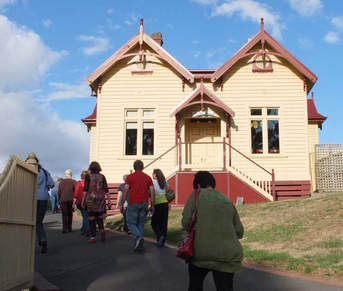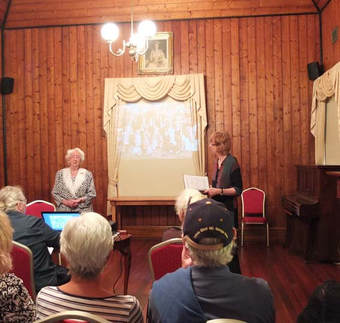 The beautiful old Jeetho Hall is all that remains of a town that once had its own school, post office and railway station.
The beautiful old Jeetho Hall is all that remains of a town that once had its own school, post office and railway station. By Catherine Watson
FOUR places, four mini-productions and a bus ride narrated by a local farmer ... the Loch Arts Council’s latest production, Places in the Heart, was a skilful mixing of history and theatre.
As she always does, writer/director Gill Heal found an untapped pool of talent – dramatic, comic, laconic – in the local community and melded it into a show that left both the performers and the audience with happy hearts.
FOUR places, four mini-productions and a bus ride narrated by a local farmer ... the Loch Arts Council’s latest production, Places in the Heart, was a skilful mixing of history and theatre.
As she always does, writer/director Gill Heal found an untapped pool of talent – dramatic, comic, laconic – in the local community and melded it into a show that left both the performers and the audience with happy hearts.
 Maggie Hunter recalls good times in the old Jeetho Hall. Writer/director Gill Heal is the interviewer.
Maggie Hunter recalls good times in the old Jeetho Hall. Writer/director Gill Heal is the interviewer. It was a modest work, but beautifully designed, staged and performed.
For her umpteenth production since she arrived in Gippsland in 2002, Heal interviewed locals and trawled the newspaper archives to find the elements of her storyline.
Anyone can do that but it’s the way she puts it altogether that reveals her mastery.
Following two successful Loch productions, A Walk through Time in 2011 and Postcards from Loch in 2012, Heal this year focused on the stories behind four buildings: the Loch Hall, the old Nissen shed that was once the Loch CFA station, the Edron homestead in Krowera, and the recently restored Jeetho Hall.
The Loch Hall segment provided some beautifully comic moments as the four reader/actors – John Fleming, Peter Gilbert, Anne Heath Mennell and Rob Hicks – turned it from a council chamber to a dance hall (including a most elegant waltz by Heath Mennell and Gilbert) and then into a Court of Petty Sessions, with members of the audience summonsed to answer charges of failing to ensure a child attended school ("fine: two shillings"), stealing a bottle of whisky ("10 days’ jail") and playing two up ("fine: 10 shillings").
From the hall, it was a brief walk down the hill to the old Nissen hut that housed Loch’s first CFA water tanker and the extraordinary account of a Loch couple, Val and John Kennedy, who manned the CFA radio seven days a week for 40 years.
Then onto the bus for the exhilarating hill climb to Jeetho, with detours along the way to Krowera and to Sheepways Road. Farmer/ historian Greig Barry providing a fascinating commentary on the scenes around us, transforming our vision to that of the 1850s and 1860s.
From this Krowera farm, the farmer walked to Woodleigh to pick up a load of iron for his dairy roof, carrying it home on his head. He also used to walk to Grantville for the monthly dance, dance most of the night and walk home the next day.
From Jeetho, a schoolteacher walked up and down dale each week to teach at the Woodleigh School, some 15 kilometres away. Later, when the Jeetho School was finally built, another teacher was so highly regarded that Cranbourne families used to send their children down on the train each day to study at Jeetho.
It was fascinating stuff, as was an account of the first owners of Edron homestead in Sheepway Road, read by the current owners, Don and Carole Santin.
From there it was down to Jeetho Hall, which, like Loch, served a multitude of functions, from home of the CWA and church groups to dance hall and council chambers.
Ron Barnacle, Jillian Durance, Dallas Handley and Will Jelbart read the parts, as reported in a local newspaper, of local farmer/councillors at an interminable council meeting that ended at 2am. What were they arguing about? Roads, of course, and the impossibility of small dispersed communities building and maintaining them in that steep country.
In between the readings, some of the old-timers who had provided much of the meat of the story – Billy Green, Maggie Hunter, Geoff Barber and Vern Pearson – told some rattling good yarns.
This was no book learning, but the kind of knowledge passed from generation to generation, like folklore.
Heal believes such stories encourage us to see ourselves as caretakers and contributors to a community.
There was no mistaking the look of shared community - and pleasure - among those who walked out of the Jeetho Hall late last Sunday afternoon.
Catherine Watson is a friend of Gill Heal. Nevertheless, this is a true account.
COMMENTS
April 12, 2014
What a nice story about the farmer in Krowera. My father lives just 500 meters down the road and now and again relates stories from that bygone era. He is 88 and his memory is slipping these days but always enjoys those bygone days. Thanks a lot.
Andy Thomas
For her umpteenth production since she arrived in Gippsland in 2002, Heal interviewed locals and trawled the newspaper archives to find the elements of her storyline.
Anyone can do that but it’s the way she puts it altogether that reveals her mastery.
Following two successful Loch productions, A Walk through Time in 2011 and Postcards from Loch in 2012, Heal this year focused on the stories behind four buildings: the Loch Hall, the old Nissen shed that was once the Loch CFA station, the Edron homestead in Krowera, and the recently restored Jeetho Hall.
The Loch Hall segment provided some beautifully comic moments as the four reader/actors – John Fleming, Peter Gilbert, Anne Heath Mennell and Rob Hicks – turned it from a council chamber to a dance hall (including a most elegant waltz by Heath Mennell and Gilbert) and then into a Court of Petty Sessions, with members of the audience summonsed to answer charges of failing to ensure a child attended school ("fine: two shillings"), stealing a bottle of whisky ("10 days’ jail") and playing two up ("fine: 10 shillings").
From the hall, it was a brief walk down the hill to the old Nissen hut that housed Loch’s first CFA water tanker and the extraordinary account of a Loch couple, Val and John Kennedy, who manned the CFA radio seven days a week for 40 years.
Then onto the bus for the exhilarating hill climb to Jeetho, with detours along the way to Krowera and to Sheepways Road. Farmer/ historian Greig Barry providing a fascinating commentary on the scenes around us, transforming our vision to that of the 1850s and 1860s.
From this Krowera farm, the farmer walked to Woodleigh to pick up a load of iron for his dairy roof, carrying it home on his head. He also used to walk to Grantville for the monthly dance, dance most of the night and walk home the next day.
From Jeetho, a schoolteacher walked up and down dale each week to teach at the Woodleigh School, some 15 kilometres away. Later, when the Jeetho School was finally built, another teacher was so highly regarded that Cranbourne families used to send their children down on the train each day to study at Jeetho.
It was fascinating stuff, as was an account of the first owners of Edron homestead in Sheepway Road, read by the current owners, Don and Carole Santin.
From there it was down to Jeetho Hall, which, like Loch, served a multitude of functions, from home of the CWA and church groups to dance hall and council chambers.
Ron Barnacle, Jillian Durance, Dallas Handley and Will Jelbart read the parts, as reported in a local newspaper, of local farmer/councillors at an interminable council meeting that ended at 2am. What were they arguing about? Roads, of course, and the impossibility of small dispersed communities building and maintaining them in that steep country.
In between the readings, some of the old-timers who had provided much of the meat of the story – Billy Green, Maggie Hunter, Geoff Barber and Vern Pearson – told some rattling good yarns.
This was no book learning, but the kind of knowledge passed from generation to generation, like folklore.
Heal believes such stories encourage us to see ourselves as caretakers and contributors to a community.
There was no mistaking the look of shared community - and pleasure - among those who walked out of the Jeetho Hall late last Sunday afternoon.
Catherine Watson is a friend of Gill Heal. Nevertheless, this is a true account.
COMMENTS
April 12, 2014
What a nice story about the farmer in Krowera. My father lives just 500 meters down the road and now and again relates stories from that bygone era. He is 88 and his memory is slipping these days but always enjoys those bygone days. Thanks a lot.
Andy Thomas